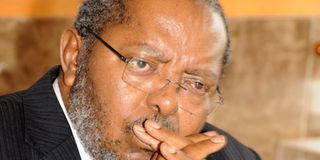How one man’s fiscal sins are being paid by all

Mr Mutebile advised Ugandans to borrow from low-interest banks. FILE PHOTO
Today, we celebrate one week into the New Year. We have also been told that Uganda’s year-on-year inflation rate has slightly eased for the second consecutive month. The Consumer Price Index, compiled by the Uganda Bureau of Statistics, shows that inflation dropped to 27 per cent in December, down from 29 per cent recorded in November.
This week, the Acting Secretary to the Treasury, Mr Keith Muhakanizi, walked into the Daily Monitor newsroom with a swagger and assured whoever cared to listen: “2012 will be a bad year for journalists. The economy is rebounding at a supersonic speed. And [financial] scandals are reducing. You will have no news.”
Whether you believe Mr Muhakanizi’s posturing or not, what is obvious is that the reality in 2012 is stomach-turning. First, most of the economic indicators show that our economy is in peril because of untamed corruption and misuse of public resources. Mr Muhakanizi should know that businesses are collapsing because of high interest rates.
Sadly, the high interest rates are a result of fiscal sins committed by Bank of Uganda and ministry of Finance officials. In fact, in an attempt by the BoU Governor, Mr Emmanuel Tumusiime-Mutebile, to clean his mess, he decided to increase Central Bank Rate (CBR) from 20 per cent in November to 23 per cent in January. In the circumstance, commercial banks had no choice but to increase their prime lending rates from about 25 per cent to as high as 30 per cent to date.
The reason for this bothersome economic situation is the steep rise in inflation and repeated hikes in interest rates. While the BoU has failed to contain the double-digit inflation despite claiming to have taken ‘robust measures’, it has watched from the sidelines as profit-oriented commercial banks repeatedly increase interest rates even on old loans.
Faced with this bleak economic scenario, people like Mr Muhakanizi who are watching over our economy, instead of taking corrective measures, are busy offering gestures by way of promising a rebound in the near future. That notwithstanding, a discredited promise lacks credibility and that is why some legislators have asked traders to close their shops if BoU does not intervene to reduce the soaring interest rate.
But who caused the mess we are in today? Well, the government can no longer get away by blaming the economic difficulties on imported inflation in the region and global factors. As a matter of fact, external factors can at best play a peripheral role in deciding the contours of our economy; they cannot determine its course entirely. If anything is to be blamed for this mess, then, the Governor and Mr Muhakanizi - and his senior colleague, Mr Chris Kassami, should take the blame.
These people have failed to stop the mismanagement of public funds kept in Bank of Uganda. They have watched financial scandals unfurl one after the other. They are responsible for excess liquidity.
What broke the camel’s back?
For instance, BoU, with the blessing of the Treasury, authorised the expenditure of Shs1.7 trillion for the purchase of fighter jets and other military hardware without parliamentary approval. I am told part of the controversial Shs602.5 billion supplementary budget was sourced from BoU. The Central Bank also printed money (new currency) and it’s being circulated together with the old notes. Definitely this, in some way, increased liquidity. How about the Shs169 billion to businessman Hassan Basajjabalaba and others? What about the Shs800 billion in uncollected loans to private individuals and state enterprises?
More so, the Auditor General says government borrowings from Bank of Uganda has increased by 25.8 per cent from Shs25 trillion to Shs3.1 trillion which is beyond the statutory limit prescribed under the BoU Act. Included in the borrowings made as of June 2010, was Shs449 billion borrowed without the approval of Parliament which was also not recognised in the Consolidated Financial Statements.
Though Uganda’s deep-seated economic malaise has robbed the wanachi of their savings, rendered trade practically hollow and undermined domestic productivity, I strongly believe that an effort to reform the country’s political corruption and irresponsible monetary policies at BoU will be central to establishing social and economic stability in the long run.
While central banks have traditionally been the regulators of banks, this week, I heard our Governor blustering as if traders are not suffering. He said he will not ask commercial banks to reduce the high interest rates as proposed by city traders and legislators. Even though it is true, ours is an open economy, in a flimsy economy like ours, we cannot balance books on the backs of the poor.
In any case, the financial indiscipline that caused this mess was not brought by deprived borrowers but the Governor and others. If he had tamed the government appetite, things would have been different. Otherwise, to ask disgruntled Ugandans to shift from banks with high interest rates to those charging lower ones is being insensitive to the plight of borrowers.
Our economic policies have in many ways deepened poverty and made doing business in the formal sector prohibitively costly. Excessive government spending and chronic fiscal indiscipline needs serious attention. Rather than take steps to correct policy failures and institutional weaknesses, our technocrats speak like politicians who promise bridges where there is no river. The economy cannot rebound without physical reforms and serious government intervention.
Fixing the economy certainly requires concerted effort from a wide range of stakeholders, especially Ugandans. The government needs to invest in farmers, create favourable environment to attract foreign investors by reducing the cost of doing business and make corruption a risky business.




